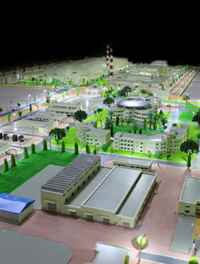India's Indira Gandhi Centre for Atomic Research (IGCAR) has awarded Hindustan Construction Company (HCC) a contract worth INR 7.64 billion ($120 million) to construct a fast reactor fuel cycle facility at Kalpakkam.
 |
| Designer's view of the IGCAR complex (Image: HCC) |
The scope of the work includes the construction of nuclear safety compliant structures for fast breeder reactor fuel processing plant, plus associated civil, electrical and mechanical works. The project is to be completed in 48 months.
Fast breeder reactors feature as the second step towards India's long-term goal of establishing a fuel cycle to exploit its abundant thorium resources, using the plutonium produced in pressurised heavy water and light water reactors and breeding fissile uranium-233 from thorium. Construction work began on a 500 MWe prototype fast breeder reactor (PFBR) at Kalpakkam in Tamil Nadu in 2004. Atomic Energy Minister Jitendra Singh in July told India's lower house, the Lok Sabah, that the unit will start up this year. The PFBR is being built by Bharatiya Nabhikiya Vidyut Nigam Limited (Bhavini), a government enterprise under the Department of Atomic Energy (DAE). Two further FBRs are planned for the Kalpakkam site.
India has long planned for a facility to recover the unused plutonium and uranium, to be ready in time to process the first used fuel from the PFBR. The Indian government in 2013 approved construction of such a facility at Kalpakkam to cater for the PFBR and other fast breeder reactors.
The fast reactor fuel cycle facility is the fourth construction contract awarded to HCC by IGCAR, with earlier contracts covering administrative blocks, township and the metallic fuel plant. The company is also executing DAE contracts at an integrated nuclear recycle plant for the Bhabha Atomic Research Centre at Tarapur and two pressurised heavy water reactors under construction at Rawatbhata.
"With our well experienced team, we are confident of delivering this job on time with precision in quality, safety and state-of-the-art technology," HCC president and CEO Arun Karambelkar said yesterday.
Researched and written
by World Nuclear News




_87299.jpg)
_52351.jpg)








